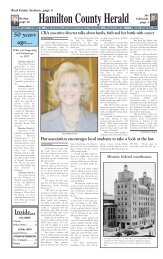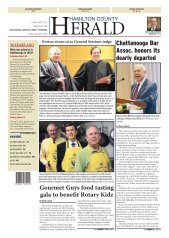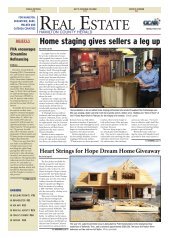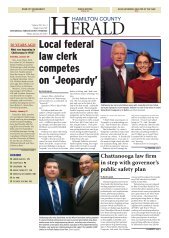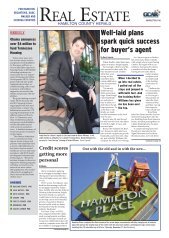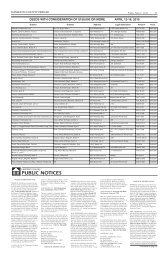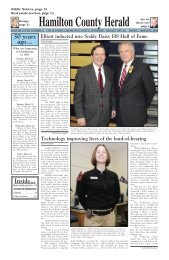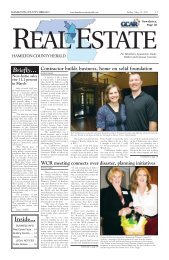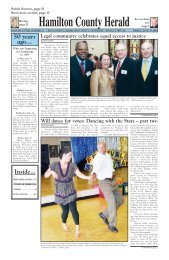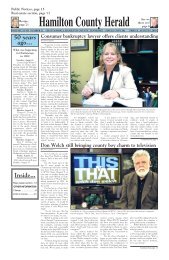50 years ago... Inside... - Chattanooga Bar Association
50 years ago... Inside... - Chattanooga Bar Association
50 years ago... Inside... - Chattanooga Bar Association
You also want an ePaper? Increase the reach of your titles
YUMPU automatically turns print PDFs into web optimized ePapers that Google loves.
12 Friday, February 20, 2009 HAMILTON COUNTY HERALD<br />
Local expert offers tips on dealing with work-related stress<br />
By David Laprad<br />
Ben Franklin said nothing<br />
in life is certain except death and<br />
taxes. These days, you can add<br />
stress to the list. With<br />
the threat of a terrorist<br />
attack looming over the<br />
US like a dark scepter,<br />
the economy tumbling<br />
like Jack and Jill down a<br />
sharp hill and employers<br />
cutting jobs like they’re<br />
going out of style, no<br />
one can escape the<br />
mental pressure cooker<br />
into which our culture<br />
has been thrown.<br />
And the effects of<br />
stress can be devastating.<br />
On a personal<br />
level, constant worry<br />
and tension can damage<br />
one’s health, relationships<br />
and quality of life.<br />
On the job, the reverberations<br />
can be seen in<br />
reduced productivity<br />
and an increase in workplace<br />
accidents.<br />
Ben Miller III of<br />
EAP (Employee<br />
Assistance Program)<br />
Care spends his working<br />
hours dealing with stress<br />
in the workplace. And<br />
he says recent developments in<br />
America have made minimizing<br />
the effects of anxiety and pressure<br />
a whole new ballgame.<br />
“We’ve never had to manage<br />
security issues resulting from<br />
terrorism and it’s been a while<br />
since we’ve had to deal with men<br />
going to war,” he says. “We have<br />
soldiers returning home, kicking<br />
the dust off their boots and going<br />
to work the next day. That’s<br />
stressful.”<br />
Historically, economic concerns<br />
have always been a factor,<br />
but Miller says the heat has<br />
become excruciating, which<br />
makes doing one’s job difficult.<br />
“Say you make widgets at a<br />
factory. As you watch what’s taking<br />
place in the economy, you’re<br />
going to worry about whether or<br />
not you’ll have a job tomorrow.<br />
Then at home, you have a kid<br />
acting up and a wife or husband<br />
spending too much money. Can<br />
you function properly at work<br />
with all this going on? No.”<br />
Job performance suffers,<br />
Miller says, because of the physiological<br />
effects of stress.<br />
“Our bodies are phenome-<br />
Stress on the job isn’t always a result of too much work and too little time. It can also arise from outside<br />
factors, such as economic turmoil, family stability and global crises. Unless managed, the effects of stress<br />
can be devastating. (David Laprad)<br />
nal. When we’re stressed, only<br />
the things necessary for survival<br />
continue to function.<br />
Everything else slows down,<br />
including your digestive system.<br />
Ironically, serotonin — the antidepressant<br />
our bodies produce —<br />
is made in the small intestine.<br />
So after we’ve been stressed for a<br />
while, depression sets it.”<br />
This puts a person on the<br />
fast track for anxiety, anger, hostility<br />
and hate. Many individuals<br />
cope with this process in<br />
unhealthy ways, such as turning<br />
to drugs or alcohol, ending their<br />
marriage or quitting their<br />
job.<br />
Miller’s responsibility<br />
as an EAP rep is to prevent<br />
stress from taking<br />
root, which he does<br />
through early intervention,<br />
diagnosis, assessment<br />
and treatment at the lowest<br />
level — and in the<br />
most cost effective manner.<br />
As part of his work,<br />
he might determine a person’s<br />
stress level by administering<br />
the Homes-Rahe<br />
test, which assigns numerical<br />
values to things that<br />
induce tension, and offer<br />
advice on changes the<br />
individual can make.<br />
To demonstrate,<br />
Miller grabs a pen and a<br />
piece of paper and scribbles<br />
a crude drawing of a<br />
man juggling several balls,<br />
some of which are on the<br />
ground.<br />
“All of these things<br />
we get ourselves into create<br />
stress,” he says, pointing<br />
to the balls in the air.<br />
“And we’re likely to overextend<br />
ourselves. So which one of these<br />
can you put down? Do you have<br />
to be involved in this civic club<br />
or that organization? You have<br />
to evaluate what’s truly of value<br />
to you.”<br />
Sometimes, there’s no<br />
escape, especially when work<br />
piles up and time is tight. To<br />
alleviate the ensuing stress,<br />
Miller suggests a number of<br />
activities centered on relaxation,<br />
including deep breathing,<br />
stretching, exercise, taking a<br />
bath, getting a massage and eating<br />
well.<br />
“Most people don’t know<br />
how to relax. It’s as easy as sitting<br />
up straight, taking a deep<br />
breath in through your nose,<br />
holding it and then letting it<br />
slowly out through your mouth.”<br />
In addition to eating well<br />
and getting eight hours of sleep,<br />
Miller says exercise is one of the<br />
best things a person can do to<br />
counter the effects of stress. “For<br />
<strong>years</strong>, I went to the Y every<br />
morning at six o’clock and did 30<br />
minutes of aerobic exercise and<br />
some strength training before<br />
showering and going to work.<br />
Exercising on a regular basis does<br />
wonderful things. It burns up the<br />
chemicals your body produces<br />
when you’re stressed.”<br />
It’s just as important for a<br />
person to address his mind and<br />
spirit, says Miller. Talking with a<br />
friend, seeing a funny movie, crying,<br />
reading and doing something<br />
you love can release pent-up<br />
emotions and relax your mind.<br />
“Feeding our spirit is just as<br />
important and keeping our bodies<br />
healthy.”<br />
In the end, reducing stress<br />
through the techniques Miller<br />
suggests can better equip a person<br />
to follow the advice of<br />
Franklin, who also said, “Don’t<br />
anticipate trouble or worry about<br />
what might never happen. Keep<br />
in the sunlight.”<br />
For more information about<br />
Miller’s EAP programs, email<br />
eapcareinc@aol.com. ❖



